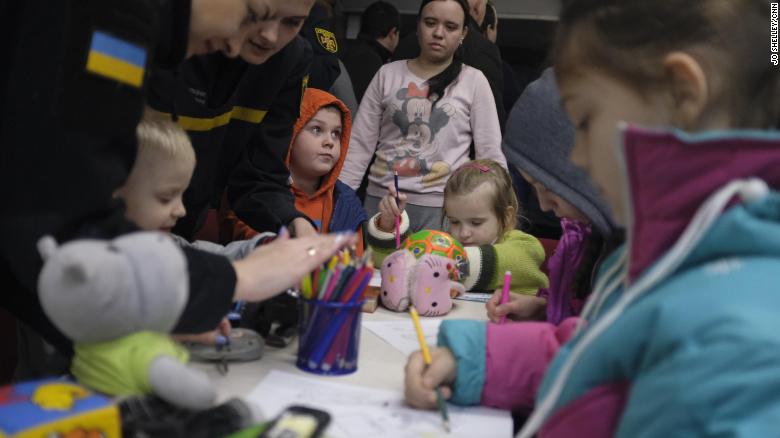'Whole families were killed': Zelensky details atrocities in Ukraine 0:32
Kharkiv, Ukraine (CNN) --
At a metro station in Kharkiv, a young woman holds up a toy car, a teddy bear and a juice container in front of a group of elementary school children.
"These are objects that we see in our daily lives," said Julia Gorlenko of Ukraine's State Emergency Service. "They are bright and colorful, but they can also be dangerous."
She points out a model of ammunition that a child could easily mistake for a toy.
"This one can blow your head off, a hand or a leg."
These coloring exercises illustrate the differences between everyday childhood objects and potentially lethal explosives.
As Russia continues its weeks-long bombardment of Ukraine's second-largest city, Kharkiv's minors receive a harsh lesson in the realities of war.
Corpses of 'executed people' left lying in the streets of Bucha as Ukraine accuses Russia of war crimes
Gorlenko teaches them how to identify Russian explosives.
Children are given coloring exercises that show the difference between a grenade and a small ball, or a gift box and a stick of dynamite.
"We used to play with all the toys in the sandbox," says 6-year-old Semen, "but now I'll be afraid to use them.
If you take a toy out of the sandbox, (something) could explode."
advertising
Children in Ukraine's second largest city have been shelled by Russian forces for weeks.
Life in the shelter
Gorlenko teaches his lessons in a Soviet-era subway station where thousands of frightened families have sought refuge since the Russian invasion began on February 24.
Kharkiv, which is only 40 kilometers from the Russian border, has been bombarded with artillery that has hit civilian places, such as schools, residential buildings and shops.
The most shocking attack was on the administration building in its central square just over a month ago, but almost daily shelling has taken place since then on residential areas across the city.
Thousands of terrified families have sought refuge in Kharkiv metro stations since the Russian invasion began in late February.
Zeena Petukhova, 36, and her husband were celebrating their daughter's first birthday when their fifth-floor apartment was hit by a mortar four weeks ago.
"We were eating cake when we heard a very unusual sound and knew we had seconds to run out into the hallway," she says.
Zeena protected her daughter, Alysa, and her husband lay on top of both of them, "like a little pyramid. This is the only reason we survived," she recalls.
The explosion blew out the windows and since then the family has been sleeping in this corner of the subway.
Some come out of shelter during the day, but life on the surface can be dangerous.
On Sunday, seven people died and 34 were injured, including three minors, after an attack in the Slobidskyi district, in the south of the city.
Residents told CNN that people were sitting on a park bench when a mortar fell nearby.
Zelensky ensures that the Russians are concentrated in Mariupol and Kharkiv
Last Friday, Ukrainian authorities said that at least 153 minors have been killed and more than 245 injured in the country during the war.
The Attorney General's Office said it was still working to establish the total number of child victims in various cities.
Two children color in the different images, a somber education about the current reality of life in their country.
Ghost city
The attacks in Kharkiv have turned this lively city into a ghost town.
A third of Kharkiv's 1.4 million people are believed to have fled, according to authorities.
Most shops, offices and places to eat are closed and there are few people or vehicles on the streets.
After the nightly curfew, the city is in pitch darkness, the silence broken by the sound of artillery fire and air raid sirens.
Underground, the sounds of war are still within earshot.
Babushka Liuda, 69, moved her family of 12 into the subway on the first day of the war.
"We heard so many bombs that we didn't know where to run or how to save ourselves," he says.
"At night there is still such shelling... I wish I could live my old age in peace."
War in UkraineViolence against minors










/cloudfront-eu-central-1.images.arcpublishing.com/prisa/B7F2F3HZ2JCUHDZJKAGKAXXPSU.jpg)